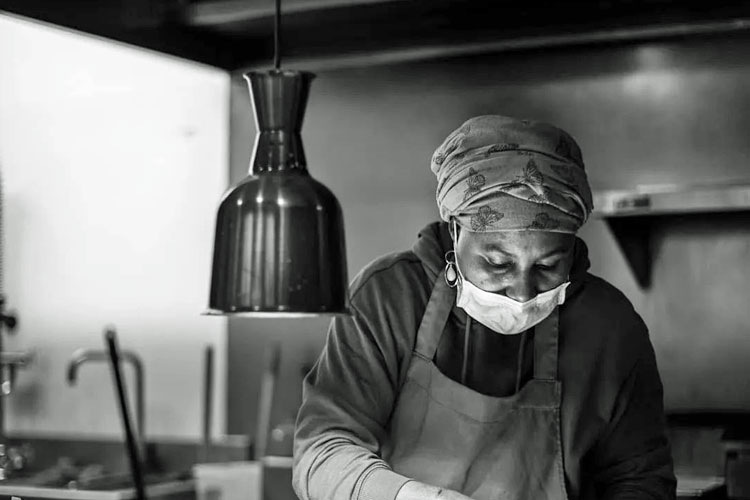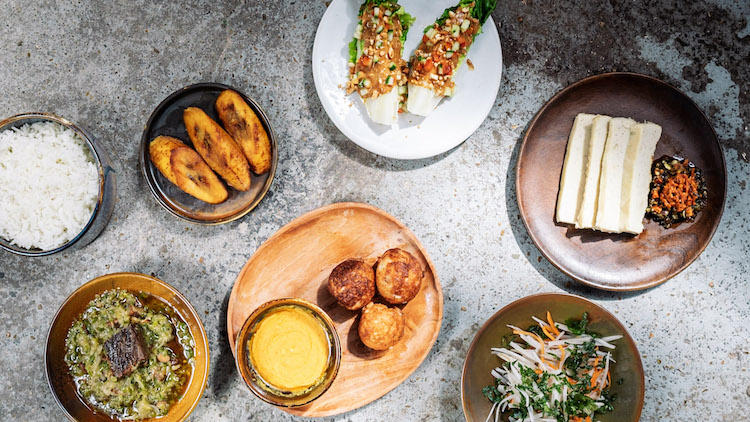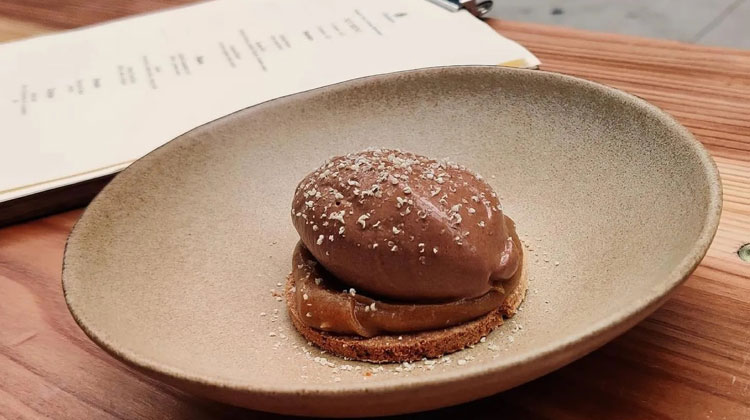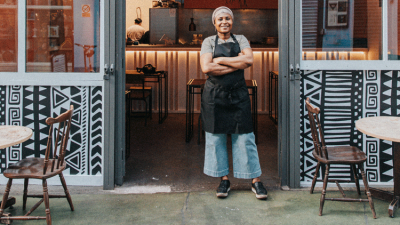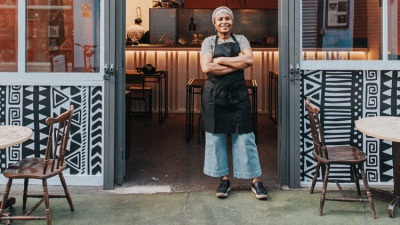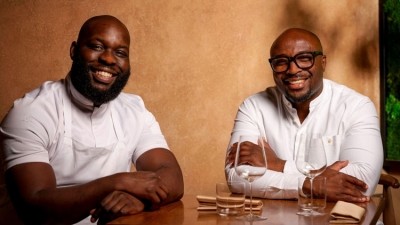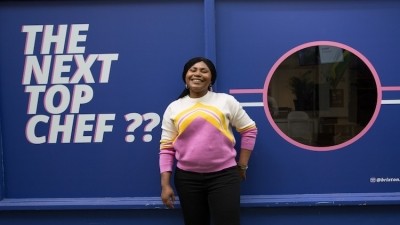The small, unassuming West African restaurant that became an award-winning sensation
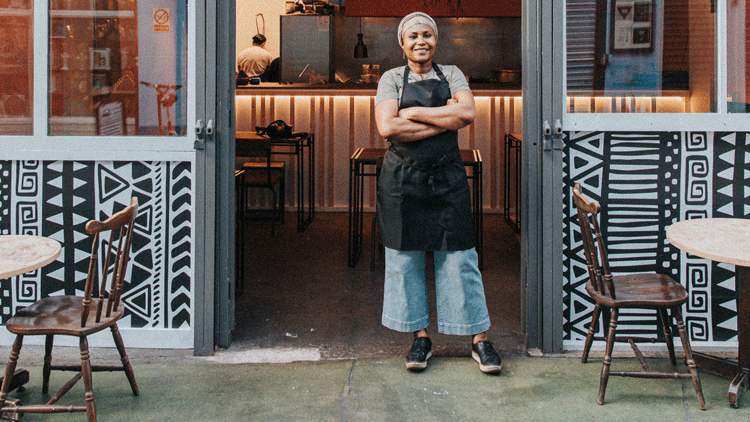
There are a number of places that appear on this year’s list of the UK’s Top 100 Restaurants that stand out for being different, but none so much as Chishuru. Occupying a tiny unit in Brixton Village's Market Row, sandwiched between a Franco Manca and Black Bear Burger, Adejoké ‘Joké’ Bakare’s modest, 20-cover West African restaurant does not immediately look like somewhere that might appear on a list that also includes Core by Clare Smyth and Moor Hall. And yet not only was it ranked as one of the best places to eat in the whole of the UK, coming it at number 93, it has picked up numerous other accolades, not least being named Time Out’s Restaurant of the Year 2022 and Eater London’s Restaurant of the Year 2021.
More impressive still is that prior to opening Chishuru Bakare had no previous professional kitchen experience and that her restaurant was originally only going to be a six-month residency at the market. So, what’s the secret of its success?
Inventive, authentic, experimental
Part of that answer is immediately obvious on meeting Bakare for the first time. Personable, interesting, and down-to-earth, anyone would feel comfortable in her presence. Chishuru might be a world away from the manicured fine dining restaurants and their minute attention to detail, but it has a warmth and a vibe more seasoned restaurateurs would sell their right arm for.
Vibe alone does not a brilliant restaurant make, and the other, more obvious reason for the success of Chishuru is its food. Despite Bakare’s lack of professional training her cooking is precise, inventive and experimental without being over wrought or fussy, with the chef intent on highlighting the lesser-known dishes of West African cuisine in her cooking and bringing a modern touch to the food of her homeland.
“I always said to myself that whatever I make, whenever my grandma comes, she recognises and eats it and understands what I’m doing,” the Nigerian-born chef says of her progressive style of cooking. “In the diaspora food is such an emotional thing and tied to memories and when you do something to change it some people seeing it as you trying to invalidate their memory. That’s why some people are very rigid about their food; it has to be like the way their grandma made it. But that’s not me. It might not look like how my grandma would make it but when she eats it with her eyes closed, she goes ‘Yes! I can taste it’. That, for me, was the basis of everything.
"Black African Americans have been digging
back into their food culture and have seen
how connected West African food is with soul food"
“It’s slightly cliché but I wanted to cook food that I ate growing up. Africa’s food culture is so diverse. A dish that people from the west make is very different to what easterners would make and both of them are very different from what northerners would make. Both my parents come from different parts of the country, and I was born and grew up in another part of the country, and the food we cooked and ate was influenced by this. It was proper fusion food.”
A set menu-only restaurant might not be what you’d expect to find among the bustle of Market Row, but Chishuru’s small footprint and tiny kitchen (when service is on Bakare describes it as “elbow room only”) coupled with Bakare’s style of cooking means that any other approach isn’t viable. For less than £50 a head, diners are presented with a monthly changing menu that might feature a starter of corn bites with chicken floss and scotch bonnet sauce, followed by pan-seared scallops with uziza oil; and ose-jol – a Nigerian spiced peanut butter dip served with seasonal vegetables. There is the choice of either a fish, chicken or vegetarian main – as well as to add options from the charcoal grill such as bavette steak or whole quail – before coming back in line with dessert.
It wasn’t always this way. When Chishuru first opened it served an a la carte menu that Bakare changed daily but, as the restaurant’s popularity grew, it became untenable to continue in this manner. “A la carte didn’t really work,” she says. “People were slightly wary about what to order and it’s such a small place, there’s space for 20 people inside and 14 outside, that it just didn’t work as a business. I loved that creative part of cooking and changing things week by week but when it became too busy it got too hard.”
With a set menu, Bakare believes she has made the West African food experience as frictionless as possible for her customers. “When you come, the only thing you need to think about is ‘do I want to eat fish or chicken or maybe goat?’. When we first opened people would ask me ‘should I have this or add this?’. Most people need a bit of context and are eager to learn about the food, so now when they come we say ‘this is what we recommend, trust us’.”
A challenging inception
Changing from an a la carte to a set menu format might seem like a significant step but, given Chishuru’s tricky inception, it’s only a minor bump in the road in the restaurant’s two-year history, which has been beset with Covid-related challenges from the outset.
Bakare actually started her cooking career having been told by her friends that she should consider cheffing as a profession. “My friends told me I should open a restaurant and I would say that I’m too old for that,” she says. Cooking for numbers wasn’t an issue as the Nigerian tradition of bringing an unexpected friend over for dinner meant she always found herself preparing large amounts of food, and this eventfully encouraged her to do it in the more formal setting of a summer club. Yet while well received, they didn’t prove to be epiphany she needed them to be.
“The logistics of doing it in someone else’s kitchen was so tiring. The people who came were the same set of people who would come to my house and in my head, I didn’t think there was a market for it. I knew my food was delicious, but I didn’t think someone from another culture would go ‘oh wow’, which is a bit ridiculous because delicious food is delicious food regardless.”
Her break eventually came when she won a competition run by Brixton Village owner Hondo Enterprises back in 2019 judged by chefs including Jackson Boxer and James Cochran. Even then she would have to wait more than a year for the prize to come to fruition, with the original plan of running a six-month pop-up restaurant as part of the prize initially failing to materialise.
Things took a sudden change of pace as a result of Covid, however, with many places in the market forced to hand back their keys in mid-2020, prompting the village to get in touch and offer her a site that was once home to Mexican restaurant Casa Morita. “It was quite daunting,” she recalls. “I was recently looking at the pictures of when I first came here and they had taken everything, it was just an empty shell. It really was a DIY project.”
Her new restaurant would only be open for six weeks before the UK went into its second lockdown and would trade for just one day between December and April as the UK struggled to get a hold of the virus. Having been open for such a short amount of time before closing, none of her team we eligible for any Government support, and with her business to support during the second lockdown she began making meal kits for meal delivery platform Dishpatch.
Looking back, despite the extremely challenging circumstances in which to open a restaurant, Bakare views the experience with equanimity. “Sometimes you have to realise that there’s good in everything,” she says. “No matter how horrific the pandemic was it strengthened many people and made them think out of the box. The meal kits kept me going and all the pivots from the different restaurants made people think differently. God forbid we would have to go through it again, but I would not change how we opened.”
A glowing review by Jay Rayner in the Observer, where he called on people to “show it some love” and which was published in late 2020 certainly had a positive impact during the dark times. The mood of time also helped. “At the end of the first lockdown there was existential thing, people were going out and trying new foods and saying they needed to push the boat out a bit more. They were happy to come and try something new with us. A lot of people have since gone back to their comfort zones but if Chishuru is part of their new comfort zone then it means we did something right.”
The rise of West African cuisine
In terms of timing, Chishuru’s opening was far from perfect, but with regards to the prevailing dining trends it arguably couldn’t have arrived at a more opportune moment. Despite the size of the continent and its diverse range of countries African food has long been unrepresented in the capital beyond southeast London, but in the period that Chishuru found its feet the cuisine had noticeably started to shift more into the mainstream.
Recent times have seen the opening and hype around African restaurants in more central and prime locations, not least Akoko in Fitzrovia, Isibani in Knightsbridge, and Tatale in Southwark. Jeremey Chan and Iré Hassan-Odukale have also been flying the flag for African food at the very high end with their restaurant Ikoyi winning two Michelin stars earlier this year.
There’s more to come too with the imminent opening of the world’s first African food hall in London, designed to introduce people to what its owner describes as the world’s ‘last untapped cuisine’.
How does Bakare regard this shift in attention to the food of her homeland? “For me it mostly started with people in America. Black African Americans have been digging back into their food culture and have seen how connected West African food is with soul food. Because of that connection there’s that bridge as well.
“Most people when they think of West African food,
immediately think of jollof rice,
which is why we decided not to do it"
“Also, people are a bit more curious these days about how other cultures eat and are discovering many similarities between their country’s cuisine and other food cultures. London is such a wonderful place, there are so many different cultures and people are very accepting of them.”
Chishuru’s success can also in part be attributed to where it sits in the current African restaurant movement. Though not as elevated - or expensive - as its contemporaries such as Akoko and Ikoyi, it is a more refined culinary experience than the ‘mom and pop’ African restaurants of south London, providing an accessible and contemporary dining experience. “It’s the kind of vibe that Brixton has got - it’s slightly unusual and rough round the edges but it is also perfectly beautiful,” is how Bakare describes her restaurant. “Our food is still a bit homely, but you can see it’s also high-quality restaurant food.”
With Chishuru Bakare, who moved from Nigeria to the UK almost 25 years ago, does not follow the crowd with her menu. “Most people when they think of African food, or should I say West African food, immediately think of jollof rice (the most well-known West African dish), which is why we decided not to do it. It’s almost a cliché and there’s a feeling that we have to serve it because it’s the only kind of rice people know that comes out of West Africa. But we are rice growers, and we eat rice in many different forms.”
Bakare says there isn’t any one dish that defines her or her restaurant, but rather it is her use of spices, technique and a menu that is ever playful and innovative that makes Chishuru stand out. Boxer, who helped judge the competition that Bakare won, continues to bang the drum for it, describing her food as “clever, intricate, delicious and beautiful” and be a source of encouragement. “When we first opened, I did worry about how people might accept it,” she says. “Jackson told me ‘I’ve eaten your food and loved it, and if I love it be sure that other people will love it as well’, which helped. I knew that once people tasted it, they would like it, but I didn’t know to what extent. It’s really heartening that people have come and embraced it.”
Making a move
Such has been the rapturous reception for her restaurant from both the media and customers that Bakare’s thoughts have inevitably turned to the future. Brixton Village has proven to be the ideal launchpad for her restaurant, but its small footprint means that it is no able to cope with the demand, something that is an obvious frustration. “The waiting list is bigger than the number of people we can fit in the restaurant,” she says. “We get booked up really quickly because we are so small, the space just isn’t big enough.”
As a result, a new site is being sought after with Bakare saying that she has been searching for new premises for a couple of months now. “Brixton has shown proof of concept so I know we can take it somewhere else.”
Central London, Mayfair in particular, is off the cards, with Brixton remaining a target, although east London is also a consideration. With the confidence that it will work and some more money behind it, Chishuru mark two will be a bigger, smarter and more mature restaurant, but it won’t lose the essence that made it a success, Bakare insists.
“I’m never going to do fine dining. I want us to be considered premium casual. Yes, the new restaurant will be nice and shiny, but not too shiny.”
